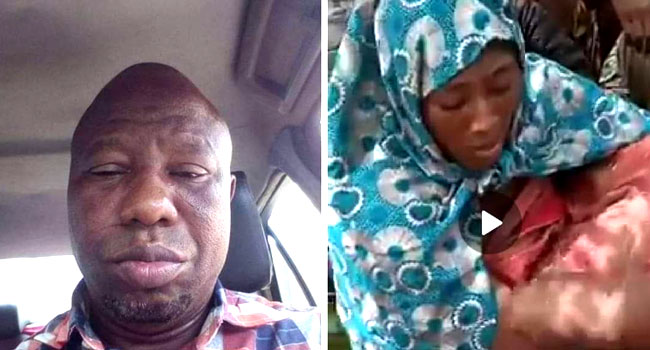Amid the continued confinement of the 39 students of the Federal College of Forestry Mechanisation, Afaka, Kaduna State 17 days after they were abducted by armed bandits, no fewer than eight members of the Redeemed Christian Church of God, Region 30, Trinity Sanctuary, Kaduna, were on Friday abducted by gunmen. Saturday PUNCH gathered that the victims were on the church bus travelling for a programme when they were attacked. A Facebook user, Eje Faraday, around 7pm broke the news on his page with a picture of the white vehicle. “All the passengers in this bus were just kidnapped along Kachia Road, 63 km from Kaduna,” he wrote. A credible source and an official of the church, who spoke on condition of anonymity, confirmed the report. He said, “They were eight in number on the bus. They were going to Kachia in preparation for the church’s Let’s Go a Fishing Easter programme. The gunmen took them out of the bus and put them in their own operational vehicle. They have yet to contact the church.” The state Police Public Relations Officer, Mohammed Jalige, said he was still making enquiries on the incident. He said, “I have contacted our officers along that axis. Actually, we have three divisions in that area. I have got responses from two divisional police officers, who said they were not aware of the incident. I am just waiting for the response of the third DPO. When I get it, I will let you know.” The RCCG Head of Media and Public Relations, Pastor Olaitan Olubiyi, did not answer calls to his mobile, which rang out several times. Meanwhile, medical experts have raised the alarm that the abducted students of the Federal College of Forestry Mechanisation may suffer panic disorder, nightmares and other manifestations of post-traumatic disorder. The medical experts, comprising psychologists, psychiatrists and mental health advocate, in separate interviews with our correspondents, warned that when eventually released or rescued, the students could suffer depression, difficulty with attention in class, lack of trust and other mental issues. Parents of the students had on Monday protested and given Kaduna State and the Federal Government 48 hours to rescue the students, lamenting that they were worried about the health of their children, some of whom they said sustained injuries during their abduction. A parent who spoke on behalf of other parents during the protest, Mr Friday Sani, said, “We are by this press conference demanding that the government rescue our children by all means and within 48 hours so that the process of their rehabilitation can commence because the longer they stay in captivity the worse the situation will be.” Bandits had on the night of March 11 abducted no fewer than 30 students from the school, located opposite the Nigerian Defence Academy on Airport Road. The state Commissioner for Internal Security and Home Affairs, Mr Samuel Aruwan, said in a statement that checks by the government revealed that 39 persons, comprising 23 females and 16 males, were missing. He, however, gave an assurance that security agents were working hard to rescue the students, noting that troops of the Nigerian Army from 1 Division prevented the bandits from taking away more students and that they were able to rescue 180 persons. The state governor, Nasir El-Rufai, had insisted that his government would not negotiate with bandits, who demanded N500m ransom. The bandits also warned that the students would not go home alive should any attempt be made to rescue them. He said, “We will not engage with bandits or kidnappers. Private citizens like clerics and clergymen can do so in their individual capacities, to preach to them and ask them to repent. We also want them to repent but it is not our job to ask them to do so.” But in an interview on Friday, a consultant clinical psychologist at the Ladoke Akintola University of Technology, Ogbomoso, Oyo State, Dr Oluwafisayo Adebimpe, told Saturday PUNCH that the students might suffer panic disorder, nightmares, night terrors, being suspicious of others, hyper-vigilance, lack of trust and post-traumatic stress disorder. She added, “The longer the duration of their being in captive and exposed to the uncertainty of their fate whether they would be released or not will definitely create anxiety, panics and fear which overall is more likely to have an effect on them. “Whatever happens, some would be prone to certain behavioural changes such as post-traumatic stress disorder. Some could have some sort of phobia, usually resulting in staying away from some specific situations or places. They may isolate themselves and become solitary. “Due to this life-threatening experience, they may have a panic disorder, an abrupt surge of extreme fear and discomfort as a result of severe anxiety. Some might have difficulties with their attention and concentrations in educational pursuit.” Also, a psychiatrist and mental health advocate, Dr Maymunah Kadiri, said kidnapping of schoolchildren may pose mental health implication both in the short-term and long-term. Kadiri said, “Apart from the fact that these students are young, experiencing things like this at this stage of their life pose a real mental health implications, both in the short and long terms. “Some of them might be going through a lot from the kind of background they are coming from, I mean some were already traumatised maybe due to childhood experience while some are prone to developing mental illnesses. “The residual imprint of this in them could pose a huge issue on their mental health. Such could include dissociation, depression, sense of hopelessness, anxiety and difficulties with trusting again. It could also affect their future relationships with others.” The mental health advocate however stressed that post-traumatic stress disorder could be managed if the students were made to undergo counselling and cognitive behavioural therapy after being released by the kidnappers. She said, “Although, it is challenging to move on from tragic events, there are quite a few ways to cope when dealing with the emotional after-effects of a distressing experience. Counselling and cognitive behavioural














